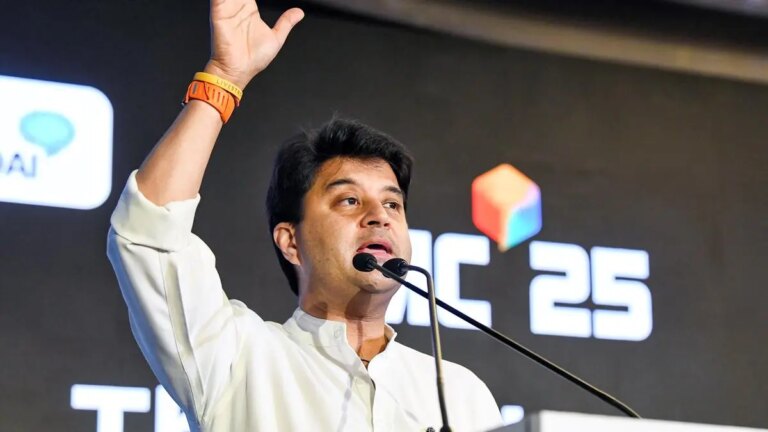
The Union Communications Minister, Jyotyraditya M. Scindia, addresses the meeting at the launch of the theme of the Mobile Congress of India (BMI) 2025, in New Delhi on Monday | Photo credit: ANI
The Government has said that the launch time of satellite communications (SATCOM) in the country will depend on the individual calls of the companies, once the prices and areas are completed.
Elon Musk Starlink, along with other satellite communication suppliers, such as Eutelsat Oneweb, backed by Bharti Group, the joint company of Reliance Jio with SES and Globalstar, have plans to compete in this space of new communication technologies.
Speaking outside an event here, Jyotyraditya Scindia, Minister of Communications and Development of the Northeast Region, said: “That (launch time) depends on the company’s own plan. Our work is to be able to provide the license, if they have met all the conditions, which two companies had (Bharti and Reliance) and the third company (Starlink) do the same.”
Scindia said that the rules for spectrum allocation by the Telecommunications Regulatory Authority of India (Trai) have also come out now, so the next steps of the administrative spectrum allocation can be tasks.
“.. Deny individual companies to define their own path … we cannot define that for them,” Scindia added.
Earlier this month, Trai had recreated that the satellite spectrum should be charged in four percent of the gross revenue (agr) for the non -operational satellite orbit (NGSO) and the Geostational Satellite orbit service (fixed satita) of satito service.
NGSO refers to those satellites that occupy an orbit of lowland (leo) or orbit of Middle -earth (MEO). Unlike GSO geostational satellites, Leo and Meo satellites do not occupy a stationary position, but move in relation to Earth.
The recommended key frequency bands include Ku, Ka, Q/ V for dates and internet, and bands L, S and C for mobile bonds. According to the recommendations, the spectrum will be assigned for up to five years, extendable for two years.
Eutelsat Oneweb and Jio Satellite Communication backed by the Bharti group have already received the Global Satellite Mobile Personal Communication Services license (GMPCS) necessary to provide satcom services in the country. Once Starlink also gets the license soon, the departure of the services can begin, analysts said.
Meanwhile, Scindia presented ‘Innovate to transform’ on Monday as the theme of the ninth edition of India Mobile Congress 2025 (BMI 2025), scheduled to be held from October 8 to 11 at the Yashobhoomi Convention Center, New Delhi.
Organized by the Department of Telecommunications (DOT) and the Association of Cellular Operators of India (COAI), the BMI 2025 is expected to attract more than 1.5 LAKH of visitors from more than 150 countries, present about 400 exhibitors and partners.
‘The Them’ innovate to transform ‘the contours and underline the concept that on this transformation trip, innovation has always focused on the compass of India. We are among the six main countries that request 6G patents. World, which is avant -garde, customer -oriented and services oriented, ”said Scindia and added that India is now the prioritization of telecommunications customer protection in the digital economy.
The minister also launched the Sagancha Mitra scheme that aims to strengthen the connection between the telecommunications and citizens sector.


